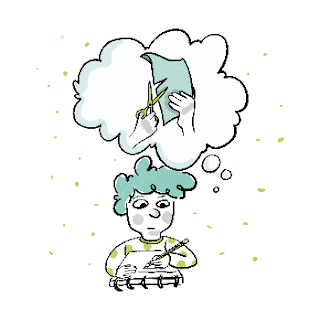WRITING Mindcraft - Beware...
In this Mindcraft Series, Catherine Whitmore tells us why, as writers, we should be mindful of the stories we tell ourselves.
We’re an imaginative bunch, aren’t we, us SCBWIs? Yes, I hear you say, proudly.
And never more so than when we’re making up stories about our own lives, about our own writing? Hmm, I hear you mumble, suspiciously.
Here’s some stories that you might recognise as having told yourself:
• Writing is hard.
• Publishing is hard.
• People like me don’t get published.
• It takes luck to get published, it’s out of my hands.
• I’ve missed my chance.
• It’s not my turn.
• Such a Writer already wrote about talking toasters/ star-crossed lover lobsters/ the fisherman who couldn’t swim, so there’s no point me finishing my novel about them. They got there first.
• That other book in my head is much better than this shambles I’ve been working on all year. I’ll put all my energy into the new idea. That really is the most sensible option.
• My agent isn’t getting back to me because I’m not important and they’ve realised I’m actually rubbish.
We say these things. We hear these things. But should we consider them fact, or part of our body of fiction work?
Well, let’s reach for the dictionary, or, google it, anyway:
Fact: a thing that is known or proved to be true. Fiction: something that is invented.
We’re so used to thinking that if we think it, and can reason it, and have evidence for a thought, then it is true.
Well, if the thought is empowering you, serving you, energising you, then stick with it. Why not? What if a story that you have told yourself, like one of the ones above, is not doing any of those things? What if it is draining you, stopping you from working towards your goals, enjoying your writing, preventing you from submitting or networking? Well then, it could be time to consider a major edit.
The stories above, and you can add your own, are not indisputable truths. They are fiction. They are thoughts.
There will always be someone out there who will show you otherwise, if you are willing to look and see.
Writing is hard? I know a dozen people who hammer out words for fun.
Publishing is hard? I know authors who drafted a book and were signed by the first agent they submitted to.
If the thought, ‘writing is hard’, leaves you feeling determined and driven, then keep it. You might be the type of person for whom a Desert Ultra Marathon sounds like time well spent. But I’m not that person. When my friend told me they were running 220km in Wadi Rum, my first question was ‘why?’ My second and third involved chaffing and toilet facilities. The thought, ‘writing is hard’, makes me want to put the kettle on rather than charging, Braveheart style to the computer.
That’s OK, but it doesn’t serve my overall goal. A brew and a biscuit are delicious, but they don’t move my life forwards in the direction I want it to go.
So, I first of all remind myself that ‘writing is hard’ is a thought, not a fact.
I forgive myself, and approach the thought as if it was a shabby first draft. No, not with despair and judgement! With curiosity and compassion.
And once I understand the thought fully, I might do a bit of editing. Perhaps choose a new thought. One that I can believe. One that will move me towards my goals, leaving me empowered, productive and energised.
Some days it might be, ‘I love writing.’ Some days it’s more of a ‘if I do five minutes, I’ll probably want to do twenty more.’
In short, remember that we create stories. We create them for others, but also for ourselves. Choose the story that you want to tell yourself, for yourself.
Enjoy!
*
*
Ell Rose is the Illustration Features Editor of Words & Pictures. Contact them at illustrators@britishscbwi.org
Tita Berredo is the Illustrator Coordinator of SCBWI British Isles and the Art Director of Words & Pictures. Contact her at: illuscoordinator@britishscbwi.org











No comments:
We love comments and really appreciate the time it takes to leave one.
Interesting and pithy reactions to a post are brilliant but we also LOVE it when people just say they've read and enjoyed.
We've made it easy to comment by losing the 'are you human?' test, which means we get a lot of spam. Fortunately, Blogger recognises these, so most, if not all, anonymous comments are deleted without reading.